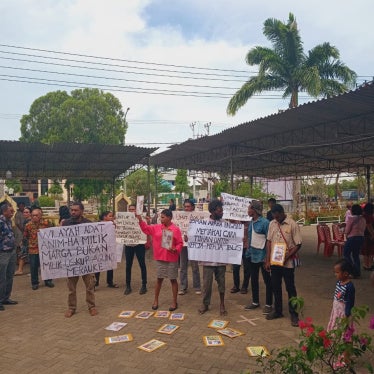Last week's controversy over Libya's election as chair of the UN Commission on Human Rights put a spotlight on the crisis facing the world's leading human rights body. The commission plays a critical role in developing human rights treaties, investigating human rights abuses and naming and shaming some of the worst offenders. But over the past few years repressive governments have flocked to join the commission, intent on blocking criticism of each other and white-anting the international human rights system.
In this context, the election of Australia as the commission's vice-chair should be good news. Australia returns to the UN body after an absence of six years and was the Western group of countries' choice for the bureau that will oversee the next session when it convenes in Geneva in mid March.
Australia has done a lot for the human rights cause over the years, including helping to draft the Universal Declaration of Human Rights and bring the commission into being. But given its deteriorating record on human rights and its hostile attitude to international scrutiny, Australia might well prove to be a wolf in sheep's clothing.
You only need to look at Australia's performance during the past year on key human rights issues.
In its overblown response to the unauthorised arrival of asylum-seekers, Australia has adopted some of the most radical and draconian measures of any country in the industrialised world, setting terrible precedents that threaten to undermine the system of refugee protection worldwide. Canberra has not only subcontracted out these policies to its Pacific neighbours, but has aggressively promoted them internationally, even questioning the basis of the refugee convention.
Australia is one of the only industrialised countries not to have issued an open invitation to the UN's human rights experts and investigative bodies. The Howard Government is still smarting from criticism of its immigration detention regime by the UN Working Group on Arbitrary Detention and an envoy of the UN High Commissioner for Human Rights during visits to Australia last year.
Following censure of its treatment of indigenous people by the UN's Committee on the Elimination of Racial Discrimination, Australia effectively suspended its co-operation and began an international campaign to revamp the UN's human rights treaty monitoring system. To be sure, the expert committees overseeing governments' performance are hopelessly overstretched, but Australia's reform proposals seem more intent on giving governments an easier ride than on strengthening accountability.
Australia joined the ranks of some of the most abusive governments -including China, Cuba, Iran and Sudan - in opposing the adoption of a new treaty for the prevention of torture. The Optional Protocol to the Convention Against Torture, which was adopted by an overwhelming majority in November, will establish an international system for the inspection of places of detention. Although Australia ultimately had the grace to abstain in the final vote, it fought against the protocol tooth and nail, perhaps fearful of opening the doors of its immigration detention centres.
And Australia can be relied on to do the dirty work for Washington on many important human rights issues at the commission and elsewhere. Australia initially stood up to US pressure in deciding to join the International Criminal Court last June. But since then it has been negotiating a side deal with the US that would grant immunity to US personnel in the unlikely event Australia was ever asked to hand them over to the court. The US has been leaning on all its allies for impunity agreements of this kind, but Australia looks set to be the first Western nation to crack.
Australia is no Libya when it comes to human rights, but it shouldn't be assumed to be a white knight either.
The prominent role Australia has now assumed will be a test of its human rights commitments. It should show that it will stand up to human rights abusers such as Libya, which want to subvert the commission. It should speak out and vote to condemn serious abusers such as China, Russia, North Korea and Iran, which deserve censure for their terrible human rights record, no matter how powerful or strategically important they may be.
And it should clean up its own human rights act, starting with its atrocious treatment of asylum-seekers. This should start with a standing invitation to the UN's human rights monitors to visit Australia and investigate these concerns.
With Libya elected as chair, the onus will be on Australia to counter some of the damage already done to the international human rights system. Here is a chance for Canberra to restore its battered international reputation when it comes to human rights.
Rory Munoven is Global Advocacy Director of Human Rights Watch.








